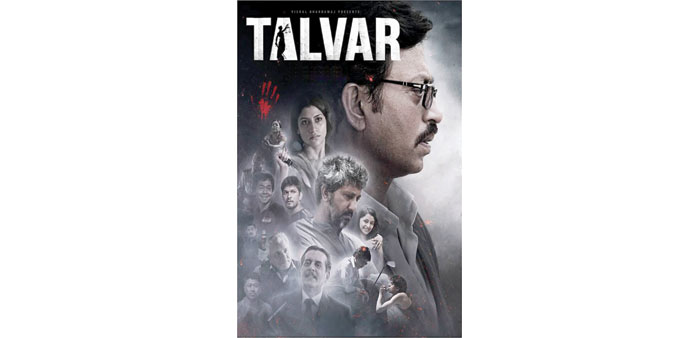By Gautaman Bhaskaran
Last year at the Abu Dhabi Film Festival, when actor Irrfan Khan spoke to me about Meghna Gulzar’s Talvar and his role as a criminal investigation officer, my interest was certainly evoked. I knew that given Khan’s brilliance as an actor, the movie would be as gripping as some of his earlier works, like Paan Singh Tomar (which premiered at Abu Dhabi some years ago), Haider, Lunchbox and Piku, were.
Also Talvar was based on, not just inspired by, the horrific murder of 14-year-old Aarushi Talwar and the 45-year-old man-servant from Nepal, Hemraj Banjade. Although Gulzar’s film is a fiction feature, every incident in it actually took place in 2008 and in the following years. The cremation of Aarushi that we see in the movie, the characterisation of her father, Dr Rajesh Talwar (an even tempered man), and the in-house rivalry in the Central Bureau Investigation (which took up the case later, after the local police had botched it up) as well as the goof-up by the Uttar Pradesh police (the murder took place at Noida in Uttar Pradesh, a city close to New Delhi) did really happen off the screen.
This is what Gulzar told me in the course of a chat over the telephone from Mumbai last Saturday. “Of course, I had to change the names, because the legal case is still going — with Aarushi’s parents, including her mother, Dr Nupur Talwar, in jail for life.” They have challenged their incarceration in the Allahabad High Court, which will hear their petition soon.
So, in Talvar, Aarushi is Shruti Tandon, Rajesh Talwar is Ramesh Tandon, Nupur is Nutun, (essayed by Konkana Sen Sharma), Central Bureau of Investigation officer Arun Kumar is Khan’s Ashwin Kumar, an officer of the CDI (in lieu of the CBI) and Hemraj is Khempal.
Written by Vishal Bharadwaj (who has given us classics like Haider, Maqbool and Omkara — all based on Shakespeare), Talvar is gripping to the core with some riveting performances by Khan (but of course) and Konkana Sen Sharma, playing a grey character that could not have been easy at all.
Despite the plot of the film being drawn from a murder that is still fresh in our minds, Bharadwaj and Gulzar steer it away from a documentary look or feel. The characters have been fictionalised to the right extent. So too, the incidents.
Stepping away from Noida to Gulzar’s canvas, Talvar never for a moment seems like a drag, and in spite of its subject — as tragic and salacious as it was (all kinds of rumours about Aarushi and her parents were floated) — the movie sails smoothly from one sequence to another, thanks to some great editing by the renowned Sreekar Prasad.
And I could not miss the humour that has been neatly written into the script, and an actor like Khan, with his understated dialogue delivery, expressions and mannerisms, is a pleasure to watch. He is so natural that he comes off as brilliant. In fact, I would dare say that he literally carries the film on his shoulders, with some great support from Sen Sharma, Neeraj Kabi (Ramesh Tandon) and Prakash Belawadi as Swamy, Ashwin’s boss.
There is cameo by Tabu, who is Ashwin’s estranged wife, and a small window — not quite necessary though to the story — that lets us into the investigating officer’s private life. Also, Shruti’s parents have been sketchily written, and I would have liked to know more about them. However, Gulzar after her rather unimpressive Filhaal (2002) and Just Married (2007), surprised me with an overall captivating Talvar. A lot of credit for this has to go to Bharadwaj, and the man who infused life into his words, Khan. But, yes, cinema being a director’s medium, Gulzar contribution cannot be overlooked.
There are some great scenes in the movie. Remember the one where Khan humiliates Gajraj Rao — who portrays the police inspector, Dhaniram — the man who completely messes up the prime investigation and calls the murder honour killing. (“The father sees his daughter in an intimate posture with the servant and kills her in a fit of rage,” he remarks gleefully)
And, how can I forget the meeting between two sets of CDI officers — with one having steered the probe in a direction completely opposite to that of Ashwin’s. The biting sarcasm, the wit and the sheer dismay of having to see an innocent man go to prison have all been woven into the narrative with dramatic imagination. Nothing feels unreal or exaggerated.
However, Gulzar’s Talvar does seem sympathetic towards Shruti’s parents. “Look a lot of people have been saying that. But what you see on the screen is what happened on that tragic night and in the months that followed,” Gulzar averred. “If there are facts that slant towards the parents, those are there in the film. We have not fabricated them. Every little thing you see in the movie is fact-based. Nobody knows the truth. But my question is, do we have a water-tight case to keep Aarushi’s parents in jail.” This is the question that Talvar as a movie has raised — and has disturbed a lot of men and women.
My own sympathies are now with the parents, and there is a sentence spoken by Ashwin which hit me hard. “It is better for 10 guilty men to walk free rather than one innocent man to be punished”. Indeed.
♦ Gautaman Bhaskaran has been
writing on Indian and world cinema for over three decades, and may be e-mailed at [email protected]

